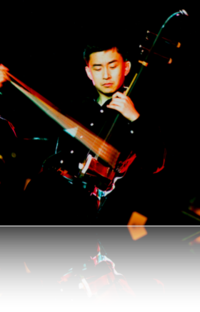George Gao: Difference between revisions
(Created page with "{{AAType |Image=GeorgeGao.png |Home page=www.georgegao.com |Arts=Arts, Music |Type=Person |Aspects=erhu }} Hailed as one of the most exciting, innovative and respected erhu maste...") |
No edit summary |
||
| (One intermediate revision by the same user not shown) | |||
| Line 4: | Line 4: | ||
|Arts=Arts, Music | |Arts=Arts, Music | ||
|Type=Person | |Type=Person | ||
|Aspects= | |Aspects=Chinese Classical Music | ||
}} | }} | ||
Hailed as one of the most exciting, innovative and respected erhu masters today, the Gemini Award nominated erhu master George Gao began studying the erhu at the age of six, a few years later, he won First Prize at the Shanghai Junior Instrumental Soloist Competition and a Silver Medal at the China National Junior Instrumental Soloist Contest in 1982. In 1985, he swept the three highest prizes of the Beijing China National Invitational erhu Competition. In 1999, He won a Recognition Award for his appearance at the 13th World Festival for Young Students in Pyongyang, North Korea. | Hailed as one of the most exciting, innovative and respected erhu masters today, the Gemini Award nominated erhu master George Gao began studying the erhu at the age of six, a few years later, he won First Prize at the Shanghai Junior Instrumental Soloist Competition and a Silver Medal at the China National Junior Instrumental Soloist Contest in 1982. In 1985, he swept the three highest prizes of the Beijing China National Invitational erhu Competition. In 1999, He won a Recognition Award for his appearance at the 13th World Festival for Young Students in Pyongyang, North Korea. | ||
Latest revision as of 00:02, 9 November 2012
Arts Music Person Chinese Classical Music
Hailed as one of the most exciting, innovative and respected erhu masters today, the Gemini Award nominated erhu master George Gao began studying the erhu at the age of six, a few years later, he won First Prize at the Shanghai Junior Instrumental Soloist Competition and a Silver Medal at the China National Junior Instrumental Soloist Contest in 1982. In 1985, he swept the three highest prizes of the Beijing China National Invitational erhu Competition. In 1999, He won a Recognition Award for his appearance at the 13th World Festival for Young Students in Pyongyang, North Korea.
George Gao studied at the Shanghai Conservatory of Music and the Royal Conservatory of Music in Toronto.
After winning the first prize in the Beijing National Erhu Competition, George Gao launched on a truly international performing career. He toured the US, Canada, France, Germany, Denmark, Japan, Taiwan, Hong Kong and China extensively and featured as a soloist with the Toronto Symphony Orchestra, Bamberg Symphony Orchestra, Aalborg Symphony Orchestra, Shanghai Symphony Orchestra, Hong Kong Chinese Orchestra, Taiwan National Chinese Orchestra, National Arts Center Symphony Orchestra, Winnipeg Symphony Orchestra, Edmonton Symphony Orchestra and I Musici etc. George Gao has also performed many recitals, including appearances at the Glenn Gould Studio, the Royal Conservatory of Music (Toronto), City Hall Concert Hall (Hong Kong), and the National Concert Hall (Taipei). Billions of people around the world have watched him on CCTV, China's most watched TV station.
George Gao is a hot session player, his erhu performance is frequently recorded by many world renowned composers, film, record producers. George is featured in the soundtrack for the popular science fiction television program Earth: Final Conflict, which has been nominated for an Emmy Award for Outstanding Main Title Theme Music.
An enthusiast of many musical styles, George organized the Beijing rock band Red Maple Leaf and the pop group Snowman. In Toronto, he collaborated with many world music artists including Jesse Cook, Donald Quan, Ron Korb and joined many world music ensembles such as Bowfire, Silk Orchestra, George Gao Ensemble and Memento. He has pioneered the development of new music for the erhu, fusing traditional Chinese music with jazz, Western Classical music, New Age, and other ethnic music from different world cultures.
As a composer, George Gao has composed music for many films and documentaries. He co-composed with Brian Keane for Bill Moyer's Productions/Lenon Documentary 3 part documentary film Becoming American, the Chinese Experience. In 2006, George Gao has co-composed and recorded the sound tracks for the Oscar winning short documentary The Blood of Yingzhou District. In 2010, The Warriors of Qiugang, another short documentary which George Gao has co-composed and recorded, has nominated by an Oscar again. George Gao is also a songwriter who has a few hit songs in China. He has written many erhu works including Capriccio for Erhu, which was designated as compulsory work for the final round of the 2002 International Dragon Cup Erhu Competition and Erhu Capriccio No. 2 - Mongolian Fantasy, which was designated as compulsory work for the final round of the 2008 Shanghai Spring Festival International Erhu Competition and 2011 Taipei Chinese Instrumental Competition for Erhu.
George Gao is a guest professor of China Conservatory of Music, Shanghai Conservatory of Music, National Taiwan University of Arts, Zao Zhuang University, Jiang Xi University of Science and Technology in China, Ogaki Women's College in Japan. George Gao is also the guest concert master of the Hong Kong Chinese Orchestra.
